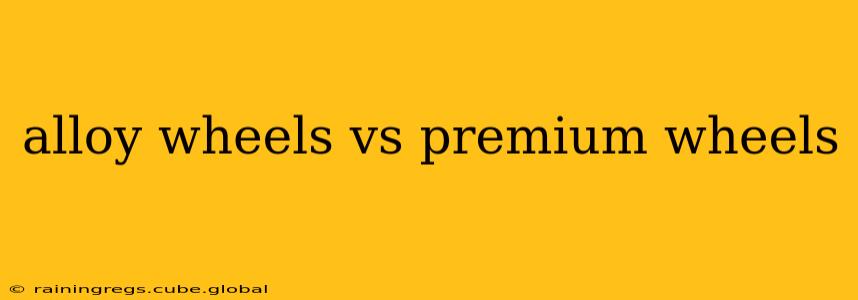Choosing the right wheels for your vehicle can significantly impact its appearance, performance, and overall driving experience. While the terms "alloy wheels" and "premium wheels" are often used interchangeably, there are key distinctions that determine their price, durability, and aesthetic appeal. This comprehensive guide will delve into the differences between alloy wheels and premium wheels, helping you make an informed decision for your car.
What are Alloy Wheels?
Alloy wheels are wheels made from an alloy of metals, most commonly aluminum or magnesium. These alloys offer a lightweight yet strong construction, providing several advantages over steel wheels. The manufacturing process involves casting or forging the molten alloy into the desired wheel shape. Alloy wheels are known for their:
- Lightweight design: Reducing unsprung weight, leading to improved handling and fuel efficiency.
- Corrosion resistance: Aluminum alloys are naturally resistant to rust and corrosion, offering longer lifespan compared to steel.
- Aesthetic appeal: They come in various styles and finishes, enhancing the vehicle's look.
- Cost-effectiveness: Generally more affordable than premium wheels.
However, alloy wheels can be susceptible to damage from potholes and curbs, and repairs can be more costly than those for steel wheels.
What are Premium Wheels?
The term "premium wheels" is a broader category encompassing high-end alloy wheels with enhanced features and superior construction. These wheels go beyond the basic alloy wheel in terms of materials, manufacturing processes, and design. Characteristics of premium wheels include:
- Higher-grade alloys: Often utilizing specialized aluminum alloys or even a combination of materials for increased strength and durability.
- Advanced manufacturing techniques: Precision forging or flow forming techniques are frequently used, resulting in superior strength-to-weight ratios.
- Sophisticated designs: Premium wheels boast intricate designs, often incorporating unique spoke patterns, finishes, and custom details.
- Enhanced performance characteristics: Some premium wheels are designed to optimize braking performance and reduce rotational inertia.
- Higher price point: Premium wheels typically come with a significantly higher price tag compared to standard alloy wheels.
What is the Difference Between Alloy and Premium Wheels?
The primary difference lies in the quality of materials, manufacturing techniques, and overall performance. While all premium wheels are alloy wheels, not all alloy wheels are premium. Think of it as a spectrum: standard alloy wheels at one end, and high-end, performance-oriented premium wheels at the other. Premium wheels represent a significant step up in terms of:
- Strength and Durability: Premium wheels are more resistant to damage, offering improved longevity.
- Weight Reduction: They often achieve even greater weight savings compared to standard alloy wheels.
- Aesthetics: Premium wheels typically offer more sophisticated and visually striking designs.
- Performance: Some premium wheels are engineered to improve handling, braking, and overall driving dynamics.
Are Premium Wheels Worth the Extra Cost?
This is a question that depends on individual priorities and budget. If performance and aesthetics are top priorities, the extra investment in premium wheels can be worthwhile. However, for those seeking a more budget-friendly option with acceptable performance and aesthetics, standard alloy wheels provide a viable alternative. Consider the following factors:
- Driving style: Aggressive driving may justify the investment in stronger, more durable premium wheels.
- Road conditions: Frequent exposure to harsh road conditions might necessitate the robustness of premium wheels.
- Vehicle type: Premium wheels might be more suitable for high-performance or luxury vehicles.
What are the Different Types of Alloy Wheels?
Alloy wheels themselves come in various styles, including:
- Cast alloy wheels: Most common type, known for their affordability and diverse designs.
- Forged alloy wheels: Stronger and lighter than cast alloy wheels, typically found on performance vehicles.
- Flow-formed alloy wheels: Combine the benefits of cast and forged wheels, providing a good balance of strength, weight, and cost.
How Do I Choose the Right Wheels for My Car?
Selecting the right wheels involves considering factors like:
- Vehicle type and size: Ensure the wheels are compatible with your vehicle's specifications.
- Budget: Set a realistic budget before starting your search.
- Driving habits and road conditions: Choose wheels that can withstand your typical driving conditions.
- Aesthetic preferences: Select a style and finish that complements your vehicle's overall look.
By understanding the differences between alloy wheels and premium wheels, you can choose the perfect set to enhance your vehicle's performance, aesthetics, and overall driving experience. Remember to prioritize safety and ensure compatibility with your car’s specifications before making a purchase.
